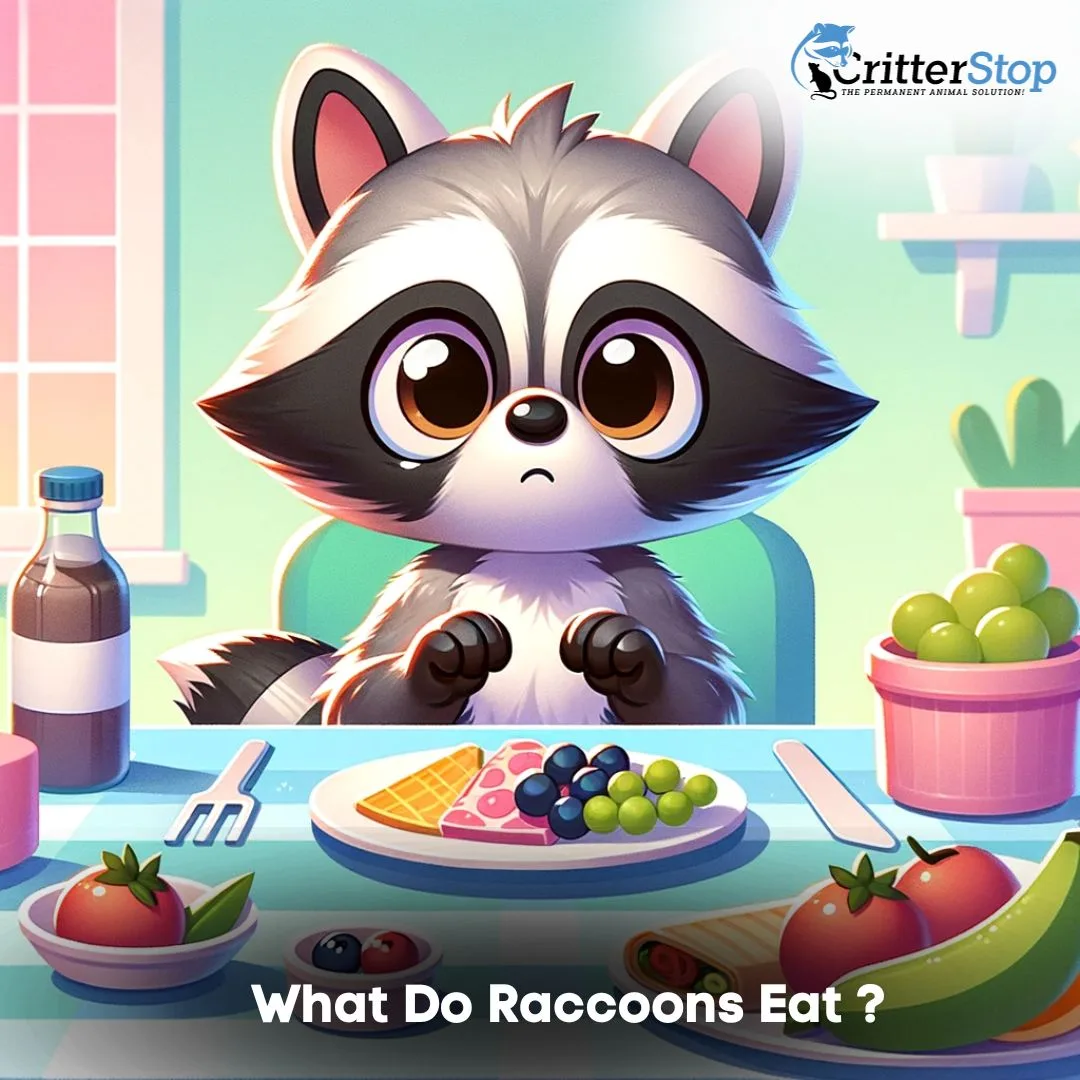
Raccoons, those charismatic creatures known for their distinctive black masks and bushy-ringed tails, belong to the Procyonidae family. They're highly adaptable mammals and animals that have made their mark across North America. Despite their mischievous antics, there's more to raccoons than meets the eye. Ever wondered what tickles their taste buds?
At Critter Stop, we have met uncountable times with these masked friends, so we know a little (big) about his food preferences. Accompany us to discover and understand everything about the raccoon menu!
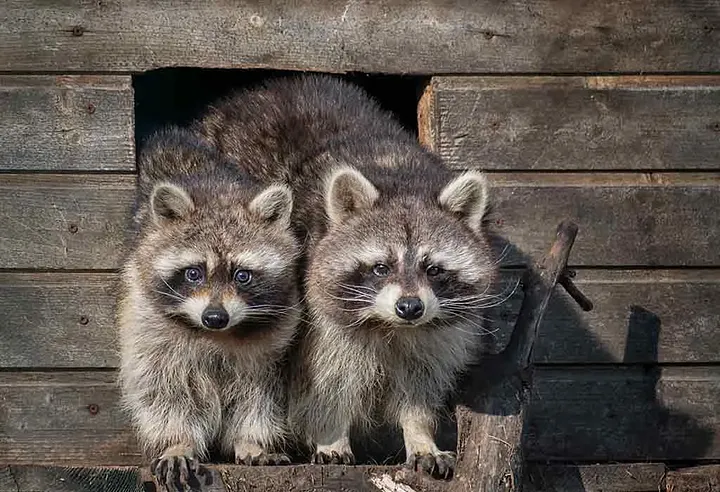
Peeking into a raccoon's diet isn't just about satisfying curiosity; it's about unraveling its survival secrets. By comprehending its food choices, we gain insights into its role in the ecosystem and can promote coexistence.
We often get asked a handful of the same questions from homeowners who have to deal with these visitors. They want to know what raccoons eat, so let’s just knock a few of those out of the way before jumping into the weeds!
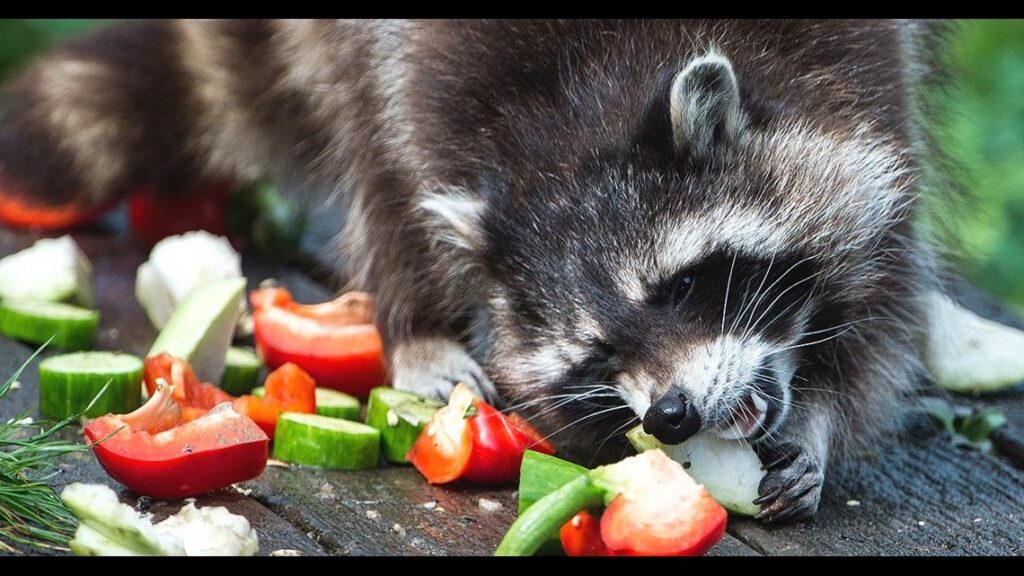
Raccoons possess a stout build covered in dense, water-resistant fur. Their front paws, resembling dexterous hands, have five fingers each. This unique feature grants them impressive manipulation skills, ideal for foraging through various food sources and giving them the ability to sneak food in almost every space.
Raccoons, the ultimate habitat hoppers, boast a knack for thriving in many landscapes. These adaptable critters aren't tied down to just one setting; they're the true nomads of the animal kingdom. Let's peek at their incredible adaptability and how their diet perfectly mirrors their chameleon-like talents.
Raccoons are like the pioneers of urban exploration. They've seamlessly transitioned from forest dwellers to city slickers, embracing the concrete jungles as much as the actual ones. Their knack for adaptation shines when you spot them rummaging through garbage cans in search of leftovers. It's like they've traded their forest foraging for dumpster diving, all while staying true to their culinary instincts.
Guess what? Raccoons are also water babies! If a creek, pond, or lake is nearby, you might just find a raccoon enjoying a fishy delight. Their adaptability isn't just about urban life; they're equally at home in wetland habitats. They've got the aquatic life down to a science, and their diet choices reflect their versatility – from fish to frogs, they know how to make a splash.
What's truly remarkable is how their diet aligns with their environment. In forests, they relish insects and small mammals; in urban areas, they're the kings of scavenging; and near water bodies, they reel in aquatic wonders. It's like they didn't care what kind of food they got; their only preoccupation is securing something for dinner.
So, the next time you see a raccoon on your property or in an unexpected place, remember they're not just there by chance. They're there because they've mastered the art of adaptation, from their dinner plate to their habitat choice.
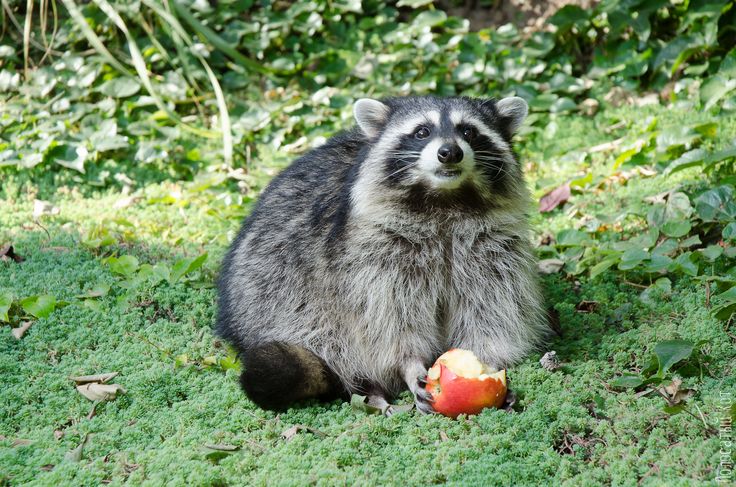
Raccoons, those sneaky bug busters, have a penchant for protein-packed snacks. Their menu includes a delightful variety of insects—beetles, worms, and juicy grubs. This keeps their energy levels buzzing and provides a valuable service to the ecosystem by controlling pest populations. It's like they're running a bug buffet with finesse!
Who would have thought? Raccoons moonlight as fruit enthusiasts! Berries, apples, and other plant goodies enter their diverse diet. But here's the kicker: as raccoons munch on these treats, they unwittingly contribute to the growth of forests. How do raccoons eat them, you ask? By spreading the seeds far and wide as they roam. They're not just eating; they're sowing the seeds of future greenery, so if you see one eating fruit in the forest, leave them alone!
Raccoons are the versatile foodies of the animal world. They venture into the realm of the wild and eat small vertebrates, proving their predatory prowess. Mice, rats, birds, and fish become fair game for these adaptable creatures. Their diet isn't just about satisfying cravings; it reflects their ability to adapt to the resources available in their environment.
Raccoons are known for their opportunistic eating habits, and their diet often intersects with the presence of other smaller animals, including rodents. The question "Do raccoons eat rodents?" can be answered affirmatively, as they are not averse to consuming rats and mice. This reality leads to inquiries like "Do raccoons eat rats or mice?" and "Will raccoons eat rats?" The answer is yes. Raccoons will prey on these rodents when given the opportunity, impacting the dynamic between rats and raccoons.
The interaction between these animals in urban and suburban areas becomes more pronounced. Homeowners often wonder, "are rats afraid of raccoons?" and "do raccoons scare away rats?" While rats exhibit caution around raccoons due to their predatory nature, raccoons are more focused on an easy meal than actively hunting. Thus, while "do raccoons eat mice and rats?" is a yes, the presence of raccoons doesn't guarantee a reduction in rat populations without targeted pest control measures like those offered by Critter Stop.
Urban raccoons are the true champions of scavenging, turning the cityscape into their culinary playground. Their sharp claws, exceptional intelligence and dexterous paws make exploring garbage cans and dumpsters a true art form.
These resourceful critters have discovered that human settlements provide an all-you-can-eat buffet of discarded goodies. They find food ranging from last night's dinner scraps to forgotten snacks. Urban raccoons' scavenging behavior highlights their adaptability and opportunistic nature, enabling them to make the most of human waste.
Raccoons have a knack for finding human fare surprisingly delectable. Their versatile palate enjoys a variety of human foods, from kibble meant for pets to the crusts of your sandwich. Ever catch them nibbling on your garden's bounty or sampling the fallen fruits from trees? It's not just their taste buds at play; raccoons are curious explorers, tasting everything they come across.
However, it's essential wild animals to recognize that while human food might be enticing, a diet primarily composed of these treats can lead to health issues. Balancing their diet with their natural food sources ensures their well-being and longevity.
You wake up to a disarray of trash cans, with their contents scattered around like confetti. Chances are, raccoons have paid a visit. Their innate curiosity drives them to investigate the contents of trash bins, hoping for a rewarding snack. This behavior isn't just about getting a quick meal; it's a testament to their adaptability and problem-solving skills. The tussle with garbage bins also underlines the need for proper waste management.
Securing trash cans prevents messes and reduces the risk of raccoons becoming overly reliant on human waste as their primary food source. This, in turn, promotes healthier raccoon behavior and a cleaner environment for everyone.
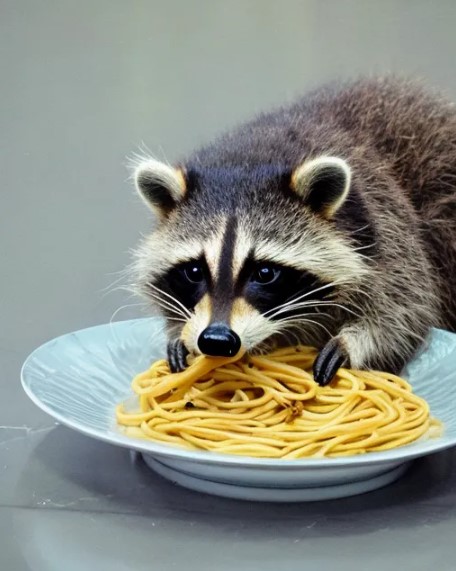
As winter retreats like a shy critter, raccoons emerge with a rumbling tummy and a growling appetite. It's time for the grand feast of the year – the spring and early summer menu extravaganza! Bugs, those little protein-packed munchies, make a triumphant return. Grubs, beetles, and worms awaken from their nap, and it's an all-you-can-eat buffet for raccoons.
Summer's still sizzling, but raccoons are set on the future – specifically, the cooler times ahead. The late summer and fall diet is like a pre-winter pantry raid. Nuts take center stage, and these fluffy-tailed creatures go nuts for them! With the energy-packed goodness of fats and calories, nuts are the secret stash raccoons need to weather the upcoming cold.
But the fun doesn't stop there – it's a fruity fiesta too! Berries, apples, and whatever tree-grown treats they can get their paws on are on the raccoons live on menu. It's a bit of a hustle to gather and stockpile, but raccoons are like nature's preppers, readying themselves for the colder times.
Winter arrives with a frosty high-five, but raccoons and nocturnal animals don't go into hibernation mode. No sir, they're out and about, braving the cold for some nibbles. Winter foraging is like a treasure hunt in the snow. While the bugs are having their winter snooze, raccoons have to get creative.
They explore nooks and crannies for dormant insects and raid their hidden stashes from the fruitful fall. It's a bit slower, and a tad trickier, but these baby raccoons have got a survival dance down to perfection.
When it comes to baby raccoons eat, what's on the menu has a direct link to their love lives. A well-fed raccoon doesn't just have a fuller belly; it has a better shot at reproductive success. A balanced diet provides nutrients for healthy pregnancies and strong, playful offspring. In other words, a raccoon with a good diet is a better mom or dad. And that's not just a win for raccoon families—it's a win for keeping their species thriving in the wild.
Imagine this: a raccoon saunters into your backyard, heads straight for your picnic table, and starts munching on your sandwich like a five-star meal. It's cute, right? But here's the thing – feeding raccoons human food can lead to a behavioral mix-up.
Raccoons might start thinking that humans mean free food, which can cause problems. They might get too comfortable pet food and a tad too brave around people. Trash cans might turn into raccoon buffets, and gardens could become raccoon feasts.
Balancing their diet by letting them stick to their natural food helps avoid these misunderstandings. It's not about being a bad host; it's about keeping raccoons dead animals and humans safe and having friendly but not-too-friendly interactions.
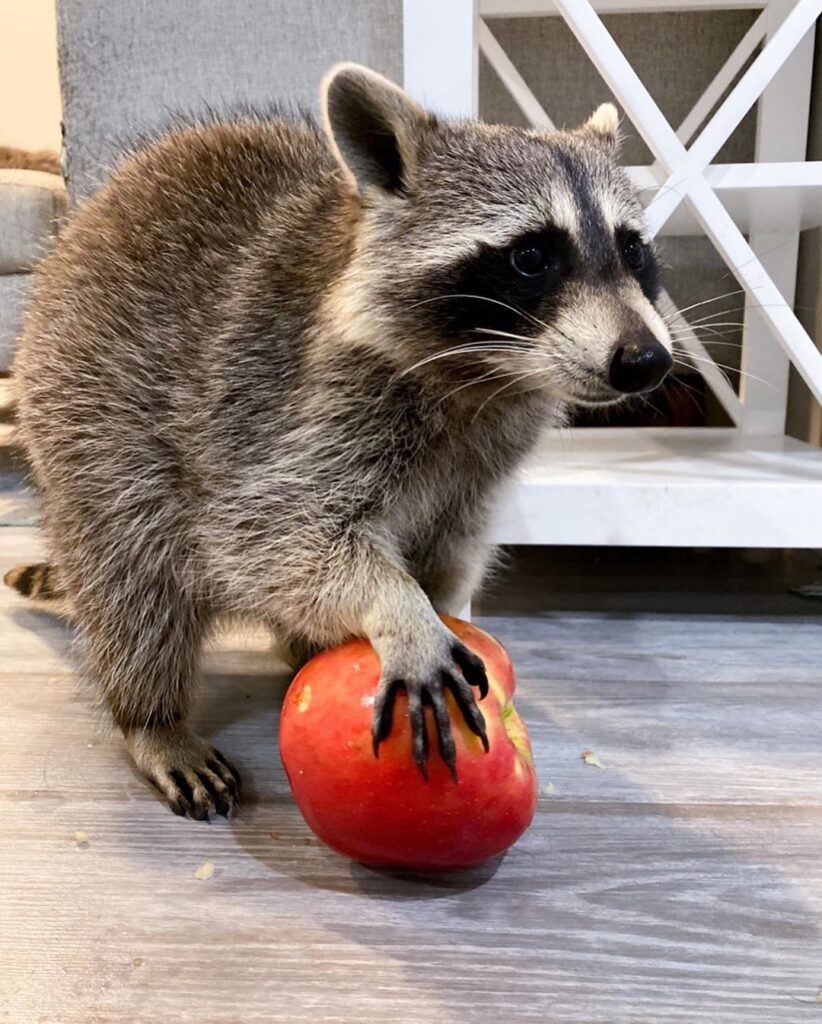
From feasting on insects to using bird eggs to indulging in fruits and nuts, raccoons showcase a diverse and adaptive dietary behavior that mirrors their ability to thrive in various environments.
While the allure of human food is strong, understanding and respecting wild raccoons'' natural diet is vital. It sustains their well-being, maintains ecosystem balance, and ensures harmonious coexistence between raccoons and the human world.
If these friends start using your kitchen, or your garbage as their restaurant, please let us know! At Critter Stop we will be glad to help you! We have provided thousands of raccoon removal Dallas services, so we know how to handle this situation. Call us at (214) 234-2616 and get a free inspection!
Visit our Critter Library and learn more about our furry friends